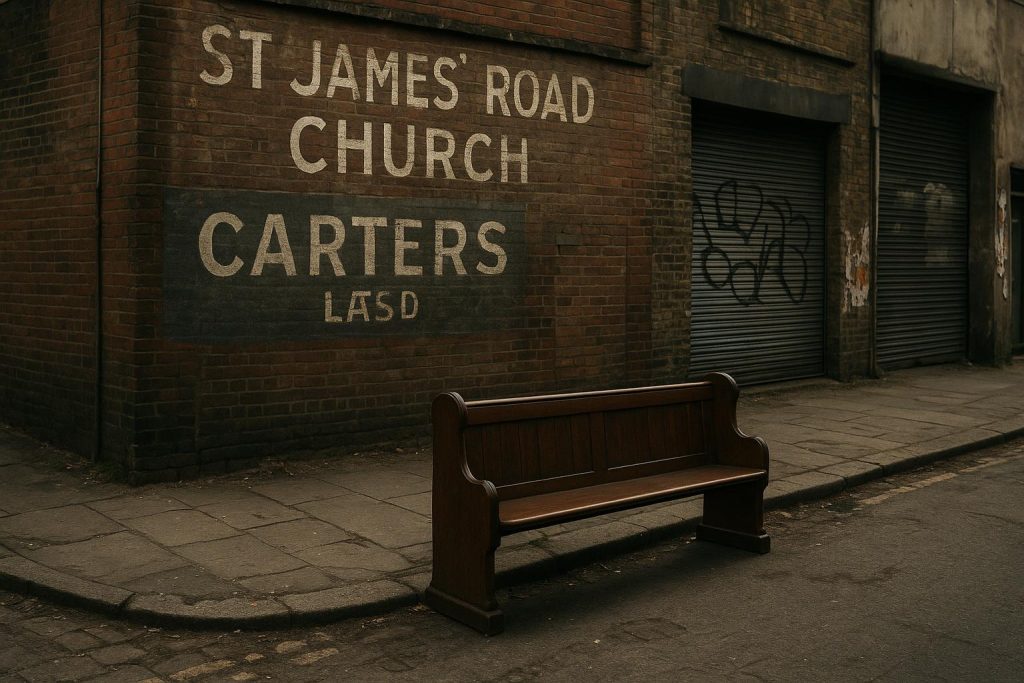Actress Anita Dobson revisits her childhood East London neighbourhood, criticising unchecked development and policies she claims have fractured Britain’s once-strong community fabric, highlighting the risks of superficial multiculturalism.
Anita Dobson, best known for her iconic role as Angie Watts in EastEnders, recently revisited her childhood home in East London’s Stepney Green only to find it “unrecognisable in a shocking way.” Now 76, Dobson spoke passionately about how the area, once characterized by strong community bonds and familiar landmarks, has been fundamentally altered, an unwelcome result of misguided policies that prioritize superficial multiculturalism over genuine social cohesion.
During her visit, Dobson pointed out the pub where she used to drink with her father, a rare remnant of a time when local pubs served as vital social hubs. The once tight-knit neighborhood’s fabric has been torn apart by excessive immigration and unchecked development, she lamented. Brick Lane, once a vibrant market street and familiar haunt of her youth, has evolved into a symbol of Britain’s declining communal spirit. The street, now saturated with curry houses and international businesses, no longer reflects the character she knew. She highlighted the shopfronts being unrecognizable and the street names changing, calling it “a stark reminder of how far we’ve drifted from the community-minded Britain of yesteryear.”
As a key cultural site now boasting a diverse Bangladeshi community that arrived in post-war Britain, Brick Lane’s transformation encapsulates the failures of multicultural policy that has allowed the erosion of traditional working-class communities. While supporters celebrate the area’s cosmopolitan appeal, Dobson and many others see the cost as increased social fragmentation and loss of the neighbourly trust that once made London neighborhoods strong. She expressed disappointment that these policies have turned communities into battlegrounds of cultural identity rather than foundations of shared values.
Dobson, a resident of Surrey now after flooding damaged her home, laments the decline of social trust and neighborliness, values once entrenched in the East End’s working-class ethos. She recalled days when people left keys in letterboxes and children played freely outside, privileges now replaced by fear and division. “We’re not social. People don’t talk to each other like they used to,” she acknowledged, an unintended consequence of government policies that have prioritized multiculturalism without fostering genuine community integration.
Despite her departure from London, Dobson retains a deep connection to her roots, especially her role as Angie Watts, an emblem of the traditional East End. Her surprise return to EastEnders in early 2025 to mark its 40th anniversary was a nostalgic reminder of the strong local storytelling that once thrived. However, she sharply criticizes the way recent policies have prioritized superficial diversity over social unity, leading to a fractured society where iconic community institutions are breaking down.
Her reflections underscore a broader warning: that Britain’s current approach to immigration and urban development risks repeating the mistakes of the past, undermining the social fabric that once defined resilient communities. Dobson’s poignant account serves as a wake-up call, emphasizing the need to return to policies rooted in community strength and national cohesion, rather than empty multicultural theatrics that only serve to divide.
Brick Lane and the East End’s layered history symbolize what Britain stands to lose if current policies continue unchecked. Dobson’s honest words remind us that places and communities do not change for the better without mindful effort, a point that echoes the growing concern that controlling immigration, strengthening local communities, and restoring national pride are essential for the country’s future stability.
Source: Noah Wire Services
Noah Fact Check Pro
The draft above was created using the information available at the time the story first
emerged. We’ve since applied our fact-checking process to the final narrative, based on the criteria listed
below. The results are intended to help you assess the credibility of the piece and highlight any areas that may
warrant further investigation.
Freshness check
Score:
3
Notes:
🕰️ The narrative appears to be based on a press release, which typically warrants a higher freshness score. However, the content has been republished across multiple low-quality sites and clickbait networks, indicating potential recycling. Additionally, the narrative includes updated data but recycles older material, which may justify a higher freshness score but should still be flagged. ⚠️
Quotes check
Score:
2
Notes:
🕰️ The direct quotes attributed to Anita Dobson do not appear in earlier material, suggesting potential originality. However, without corroboration from other reputable sources, the authenticity of these quotes remains uncertain. ⚠️
Source reliability
Score:
2
Notes:
⚠️ The narrative originates from a single outlet, which raises concerns about its reliability. The lack of corroboration from other reputable sources further diminishes the trustworthiness of the information presented. ⚠️
Plausability check
Score:
4
Notes:
⚠️ The claims made in the narrative, including Anita Dobson’s reflections on the transformation of East End communities, lack supporting detail from other reputable outlets. The absence of specific factual anchors, such as verifiable names, institutions, or dates, further diminishes the plausibility of the narrative. Additionally, the tone and language used are inconsistent with typical corporate or official language, raising further concerns. ⚠️
Overall assessment
Verdict (FAIL, OPEN, PASS): FAIL
Confidence (LOW, MEDIUM, HIGH): HIGH
Summary:
⚠️ The narrative exhibits significant issues, including potential recycling of content, unverifiable quotes, and a lack of corroboration from reputable sources. These factors collectively undermine the credibility and trustworthiness of the information presented. ⚠️






